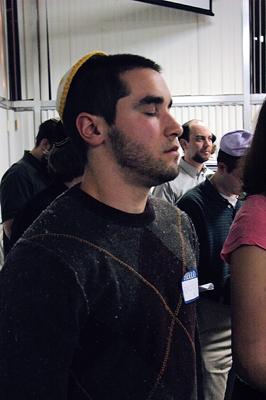
Aria Behrouzi
N.C. State students, along with students from six surrounding colleges and universities, greeted each other at the monthly Shabbat ceremony on Friday evening.
Sixty students from schools such as UNC-Charlotte, East Carolina University, UNC-Greensboro and UNC-Asheville attended the service organized by Hillel, the student group for Jewish life. The event marked the first worship service at the University to host other schools.
To Ben Mazur, a sophomore in communications, the Shabbat is a good way to get students involved in the University’s Jewish community.
“It’s really hard to find us on campus,” Mazur said. “The service is a chance for people to practice Judaism and be college students at the same time.”
For some, like junior in civil engineering Donny Katz, doing both isn’t always easy.
Katz has experienced firsthand the difficulties of continuing traditions as he continues his activities on campus.
The captain of the rowing team, Katz said he finds the Jewish holidays and practices often conflict, making attendance harder. During the same holiday season, diet restrictions make it hard for him to find proper nutrition while preparing for rowing.
But despite the difficulty, Katz said he feels his religion, “in general, does not interfere” with his life as a college student.
“It is our greatest feat and worst failure that we stick to tradition,” Marc Kastan, Hillel’s ritual coordinator, said.
Mazur said there are only about 250 Jewish undergraduate students and 50 Jewish faculty members, and said Hillel boasts a roster of 50 active members, a high percentage of activity compared to most other campuses.
Hillel’s members are from all parts of the campus community.
“We have members on the golf team, the football team, the swim team, rowing crew, Inter-Residential Council members, Teaching Fellows and marching band members,” Mazur said.
Rachel Greenstein, junior in sociology and social studies education and president of Hillel, said she is “very proud to be Jewish” and said she was excited about NCSU’s involvement with the surrounding Jewish community.
“We are not alone. We have counterparts,” Greenstein said. “We all have our common interests and we can come together.”
The efforts are making an impact on the other universities as well.
“Hosting the service reflects well and gets others involved and aware,” Chelsea Kurtzman, a sophomore in deaf interpretation at UNC-G, said.
Coming from a small town, Kurtzman said she always had a hard time finding places to go to worship. With the potential of future services at the University, she said she feels she can finally have a “good place to start” practicing her religion.
Mazur also pointed out the struggle of finding a strong Jewish community locally, and related the fact to an old Hebrew proverb — “To be strong, we must strengthen one another.”
“Even though we’re small in numbers, we’re making sure we’re strong within ourselves,” Mazur said. “We’re a huge conglomeration of Judaism, and it’s great.”